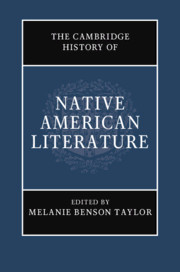Book contents
- The Cambridge History of Native American Literature
- The Cambridge History of Native American Literature
- Copyright page
- Contents
- Figures
- Contributors
- Introduction: What Was Native American Literature?
- Part I Traces and Removals (Pre-1870s)
- 1 Indigenous Languages and the Origins of American Literary History
- 2 Unsettling Colonial Temporalities: Oral Traditions and Indigenous Literature
- 3 Early Native American Literature and Hemispheric Studies
- 4 Performative Cultures of Early America
- 5 Nineteenth-Century American Indian Newspapers and the Construction of Sovereignty
- 6 Indigenous Literacies in Early New England
- Part II Assimilation and Modernity (1879–1967)
- Part III Native American Renaissance (Post-1960s)
- Part IV Visions and Revisions: 21st-Century Prospects
- Index
- References
6 - Indigenous Literacies in Early New England
from Part I - Traces and Removals (Pre-1870s)
Published online by Cambridge University Press: 18 September 2020
- The Cambridge History of Native American Literature
- The Cambridge History of Native American Literature
- Copyright page
- Contents
- Figures
- Contributors
- Introduction: What Was Native American Literature?
- Part I Traces and Removals (Pre-1870s)
- 1 Indigenous Languages and the Origins of American Literary History
- 2 Unsettling Colonial Temporalities: Oral Traditions and Indigenous Literature
- 3 Early Native American Literature and Hemispheric Studies
- 4 Performative Cultures of Early America
- 5 Nineteenth-Century American Indian Newspapers and the Construction of Sovereignty
- 6 Indigenous Literacies in Early New England
- Part II Assimilation and Modernity (1879–1967)
- Part III Native American Renaissance (Post-1960s)
- Part IV Visions and Revisions: 21st-Century Prospects
- Index
- References
Summary
This essay explores the multiple literacies of Indigenous writers from the earliest moments of American settlement, with a particular focus on early New England. The chapter sketches out the contours of early New England Native writing: its principal figures; its plural etiologies and intent; and its contested emergence at the fractious join of Native and settler spaces, institutions, and worldviews. Moving from John Eliot and his earliest missionary attempts to produce a new kind of alphabetic literacy for Indigenous converts, the essay documents the tensions between missionary-driven literacy projects and Indigenous uses of such literacy for specific political and cultural reasons. From 18th century figures like Samson Occom, Joseph Johnson to the 19th century writer and activist William Apess, Native writers produced rhetorically sophisticated texts that expressed a deep commitment to the continuity of Native peoples.
Keywords
- Type
- Chapter
- Information
- The Cambridge History of Native American Literature , pp. 113 - 128Publisher: Cambridge University PressPrint publication year: 2020



